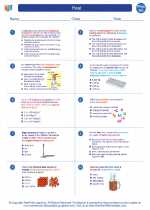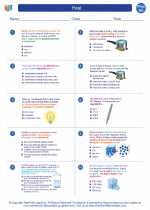Phenomena in Physics
Phenomena in physics refer to the observable events or occurrences that can be studied and analyzed through scientific methods. These phenomena can range from simple everyday observations to complex natural phenomena, and they form the basis for understanding the fundamental laws and principles of physics.
Types of Phenomena
There are several types of phenomena in physics, including:
- Mechanical Phenomena: These include phenomena related to the motion, forces, and interactions of objects, such as projectile motion, collisions, and mechanical waves.
- Thermal Phenomena: These involve the study of heat, temperature, and thermal energy transfer, including phenomena like conduction, convection, and radiation.
- Optical Phenomena: These phenomena pertain to the behavior of light, such as reflection, refraction, diffraction, and interference.
- Electromagnetic Phenomena: This category encompasses phenomena related to electricity and magnetism, including electromagnetic waves, electrical circuits, and magnetic fields.
- Quantum Phenomena: These phenomena are associated with the behavior of particles at the quantum level, including phenomena like wave-particle duality, quantum entanglement, and the photoelectric effect.
Studying Phenomena
When studying phenomena in physics, it's important to follow a systematic approach to understand and explain the observed events. Here are some key steps and concepts to consider:
- Observation: Begin by making careful and accurate observations of the phenomena, noting relevant variables and factors that may influence the behavior or outcome.
- Hypothesis: Formulate a hypothesis or tentative explanation for the observed phenomena based on prior knowledge and understanding of relevant physical principles.
- Experimentation: Design and conduct experiments to test the hypothesis and gather empirical data that can be analyzed and used to support or refute the proposed explanation.
- Analysis: Use mathematical and theoretical analysis to interpret the experimental results and derive relationships or laws that describe the phenomena within the framework of physics.
- Modeling: Develop mathematical models or conceptual frameworks to represent and predict the behavior of the phenomena, allowing for further exploration and application of the underlying principles.
- Verification and Refinement: Continuously verify and refine the understanding of phenomena through further experimentation, comparison with theoretical predictions, and incorporation of new evidence or insights.
Examples of Phenomena
Some examples of physical phenomena that are commonly studied include:
- Simple Harmonic Motion: The periodic back-and-forth motion exhibited by a mass on a spring or a pendulum.
- Thermal Expansion: The increase in size or volume of a material as its temperature rises.
- Refraction of Light: The bending of light rays as they pass from one medium to another, such as from air to water.
- Electric Charge Interactions: The forces and behaviors exhibited by charged particles in the presence of electric fields.
- Quantum Tunneling: The phenomenon where particles can pass through potential energy barriers that would be classically impassable.
Study Guide
When preparing to study phenomena in physics, consider the following key points:
- Review the fundamental concepts and principles relevant to the type of phenomena you will be studying (e.g., mechanics, thermodynamics, optics).
- Practice making detailed observations and recording relevant data from experiments or real-world phenomena.
- Develop the skills to formulate testable hypotheses and design experiments to investigate them.
- Master the use of mathematical tools and analysis techniques for interpreting experimental results and deriving quantitative relationships.
- Explore the historical and contemporary significance of various phenomena in advancing the understanding of the natural world and technological innovation.
By approaching the study of phenomena in physics with a combination of theoretical knowledge, experimental skills, and critical thinking, students can gain a deeper appreciation for the underlying principles that govern the behavior of the physical world.
.


